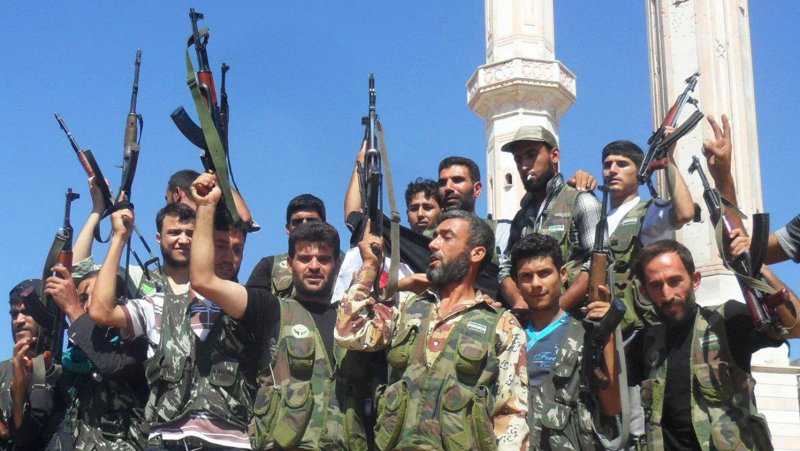Members of the Free Syrian Army chant slogans against Syrian President Bashar al-Assad in, Aleppo as they celebrate one day after the Syrian defense minister was killed in an attack in Damascus. in Aleppo in Syria, July 19, 2012. UPI/Khaled Tallawy |
License Photo
DAMASCUS, Syria, July 23 (UPI) -- The European Union bolstered its arms embargo against Syria Monday, as well as tightened sanctions against supporters of Syrian President Bashar Assad.
Responding to the deteriorating condition in the Middle Eastern country, foreign ministers, meeting in Brussels, agreed the 27-nation bloc will be required to search airplanes and ships suspected of carrying weapons or other banned gear to Syria, The New York Times reported.
The ministers also agreed to freeze assets and impose visa bans against more than two dozen more people, and to bar European companies from conducting business with three entities in Syria, The New York Times reported.
"I am deeply concerned at the escalating violence and its tragic consequences for the Syrian population," Catherine Ashton, the European Union's foreign affairs and security policy high representative, said in a statement. "The EU has warned against a further militarization of the conflict. Today we take practical steps toward limiting the supplies that fuel the fighting."
The decision on searching vessels suspected of carrying arms extends to all weapons bound for Syria, including those intended for opposition forces, one European official told the Times. Previous actions left it up to a member to decide on how to address suspect vessels based on the country's domestic laws.
Meanwhile, Syria's Foreign Ministry said the government won't use any chemical weapons in the crisis, Day Press News reported.
Speaking at a news conference carried by state-run Syria TV, Foreign Ministry spokesman Jihad Makdissi said the country's stockpile of chemical weapons are secure and would be used only in the event of a foreign attack.
"No WMD [weapon of mass destruction] will be used against civilians and weapons are guarded by the Syrian army," he said. "Chemical weapons will not be used no matter how much violence escalates in Syria."
Intelligence agencies say they think Assad has one of the largest chemical weapons stockpiles -- including mustard gas, and nerve agents VX and sarin -- in the world.
In Syria, rebels fought regime troops over control of Syria's biggest city, Aleppo, while other rebel forces retreated under heavy fire in Damascus.
The broadened fighting to Aleppo, a northern city of 2 million that is Syria's commercial and business hub, came as intelligence officials said Washington was mounting a secret but limited effort to speed the fall of Assad without using force.
It also came as Arab League foreign ministers called on Assad to "renounce power," promising "a safe exit" for him and his family.
Free Syrian Army Col. Abdul-Jabbar Mohammed Akidi said in an opposition video released on YouTube Sunday the "Brigade of Unification" sought to free Aleppo from the Assad regime.
"We gave the orders to march on Aleppo with the aim of liberating it," he said in the video.
Reached by Skype, Akidi told the Los Angeles Times his forces controlled the Salahudeen, Sakhoor and Tareeq al-Bab neighborhoods, and repulsed a counterattack by regime forces, killing 20 soldiers.
Official state media reported authorities in Aleppo had inflicted "heavy losses" on "terrorists," the government's term for the armed rebels.
Rebel officials warned people to stay in their homes. Many residents were reported fleeing the city.
In Damascus, opposition activists reported a new wave of regime attacks involving heavy artillery, tanks and helicopter gunships targeting opposition strongholds.
Residents said Free Syrian Army forces retreated but sought to reclaim their positions after heavy aerial and ground bombardment in the Mezzeh neighborhood, one of the capital's most modern and expensive areas.
Activists said regime troops Sunday executed at least 20 unarmed men in Mezzeh suspected of aiding rebels.
The Local Coordination Committees activist network said "many individuals were injured" when rocket and helicopter shelling damaged and burned the Grand Mosque in Damascus' Barzeh neighborhood.
The state-run Syrian Arab News Agency said, "Authorities, in cooperation with locals, are chasing vanquished terrorists in the streets."
SANA dismissed as "baseless" opposition claims of aerial bombardment.
Until a week ago, Damascus and Aleppo had been largely untouched by the violence roiling Syria's provinces.
The Arab League foreign ministers, ending a meeting in Doha, Qatar, called on Assad to give up power to end his country's unrest,promising safety for him and his family.
"There is agreement on the need for the rapid resignation of President Bashar Assad," Qatari Emir Sheik Hamad bin Khalifa al-Thani told reporters Monday.
The league urged the Free Syrian Army to form a transitional national unity government.
The Wall Street Journal reported Monday the Obama administration was trying to hasten Assad's fall by blocking arms and oil shipments from Iran and passing intelligence to front-line allies -- but not using force.
The effort involves the CIA, the departments of State and Treasury and the U.S. military, intelligence officials told the newspaper.
The goal, the officials said, was to get Iraq to close its airspace to Iran-to-Syria flights that U.S. intelligence determined were carrying weapons to Assad loyalists.
Some weapons flights were stopped, officials said, but others slipped through, the officials said.
Washington also tried to keep ships believed carrying arms and fuel for Syria from crossing the Suez Canal, with mixed results, the Journal said.
House Intelligence Committee Chairman Mike Rogers, R-Mich., told the Journal the effort "stops far too short of really having an impact" because there are so many ways of getting arms into Syria, including through Lebanese smuggling routes.















